Greece wrapped up the homecoming Olympics with an extravagant songfest at the main stadium for more than 100,000 people, including athletes and volunteers.
The audience cheered wildly when Jacques Rogge, president of the International Olympic Committee, delivered an anxiously awaited judgment on Athens' performance over the past 17 days.
"They were unforgettable, dream games," he said.
But after the party comes the hangover and the bill. According to initial finance ministry estimates, the cost of staging the Olympics is likely to exceed $8 billion, compared with a budgeted $4.6 billion.
The cost overruns, equivalent to about 2.5 percent of gross domestic product, would push the budget deficit above the 3 percent of GDP ceiling permitted under the eurozone stability and growth pact for a second successive year.
Costas Karamanlis, the center-right prime minister, faces two difficult tasks. One is to keep alive the feel-good factor after successfully hosting the world's biggest sports event, while at the same time imposing spending curbs in the 2005 budget.
Mr. Karamanlis has offered public sector workers, who were banned from going on holiday during the Olympics, a bonus of between $850 and $2,400 for their contribution to making the games work.
But the Socialist-dominated trade unions would still make it hard for the government to impose a proposed benchmark wage increase of about 3 percent, barely above next year's projected inflation rate.
"State corporation workers want to feel rewarded, not punished for the effort they put in to make the games work," said an official at PPC, the state power utility. Mr. Karamanlis's other task is to ensure the 35 new venues and media buildings will not continue to burden the budget after 2005.
The most important legacy for Greeks is a new public transport system, expected to speed movement around the capital, bring business to poorer neighborhoods and cut pollution. With the Olympic venues off-limits to private cars, and traffic restrictions in force during the games, Athenians immediately adopted the new transport, helped by the fact that ticket prices are heavily subsidized.
Unlike the sports and media venues, the new suburban train system and tramway, along with road upgrades for the Olympics, were partly financed through grants from the European Union structural aid package. But the previous Socialist government decided to finance the full cost of the Olympic venues out of the public investment budget, without developing a strategy for post-games use.
The venues, which range from the world's first purpose-built weightlifting stadium to a pair of artificial lakes for rowing constructed in a wildlife conservation area, have been praised by athletes and IOC officials for the high quality of construction and fittings. The main Oaka stadium complex north of the city center may become a tourist attraction in its own right, thanks to an elaborate refurbishment designed by Santiago Calatrava, the Spanish architect, to create a park around the sports facilities.
But maintenance costs will be high, amounting to $60,000-$120,000 yearly, according to initial estimates by Hellenic Olympic Properties (HOC), a state-controlled holding company that will take control of games venues in January.
Apartments in the Olympic village, built by a government-controlled housing organization to house 15,000 athletes and trainers, will be sold to public sector workers. The biggest media village, next to the main stadium, will become an residential complex.
The sports facilities may be harder to dispose of, although several Greek basketball clubs are already competing with local authorities to take over the indoor sports halls in Liosia and Galatsi, neighborhoods with few leisure facilities.
Christos Hadziemmanuel, HOC's president, says it will develop a business plan for each venue. The first move will be to organize a tender to choose a management team for the properties.
"All the venues have potential, but further investment in office and management facilities will be necessary to make them usable for cultural and athletic events," Mr. Hadziemmanuel says. "Our first objective is not to make money but to break even overall."
